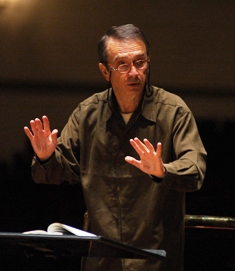
Conductor Leonid Grin Always Looking Ahead
Ukrainian-born Leonid
Grin has a favorite story. As an immigrant to the United States, just off the boat in May, 1981, he was walking past Avery Fisher Hall
in

“I saw the ad: ‘Haydn-Stravinsky Festival’ conducted by Leonard Bernstein and Michael Tilson Thomas. I just got stunned – you know, here’s Leonard Bernstein -- so I went backstage and asked where the rehearsals for the concert were. The man said ‘Right here, now.’”
Grin explained that
he had just arrived from the
The management explained that there would be an intermission in ten or fifteen minutes and that Grin could “Go upstairs and ask maestro’s permission.”
Grin went upstairs and the door to the conductor’s room was open. “He was sitting there. There were many people in the room. I was waiting. Our eyes crossed and he looked at me and said, ‘And who are you anyway, baby?’
“I looked at him (and said) ‘Maestro, my name is such-and-such.’ He says, ‘What’s your name? Leonid?’ He jumped off his seat and said ‘Leonardik, my little brother.’ That was the beginning.”
Bernstein not only
let him into rehearsal but gave him tickets to the concert and invited him to
lunch. “I could not believe it.” Shortly afterward, Grin was invited to be a
fellow at the first Los Angeles Philharmonic Institute led by Bernstein, where
he conducted at the
“After that, I saw him many times, said Grin, speaking by phone from Philadelphia where he now makes his home. "He was so kind and generous in offering his time. As they say, he was a mensch (Yiddish for “human being,” a good person). He never forgot his humanity. Being the great Leonard Bernstein, he was always accessible to people around him.”
Grin will make his debut with the Cincinnati Symphony Orchestra Oct. 31 and Nov. 1 at Music Hall (Tchaikovsky's Symphony No. 5, Samuel Barber’s Violin Concerto with guest artist Tai Murray). He treats life, he says, “like a book, an unread page every day you wake up. I think it’s very important for people to have an openness for the next. I am always looking forward.”
Grin was music director for
10 years of the San Jose Symphony, a 123-year-old orchestra
that despite being based in well-off
His optimism and enterprise have led to things like studying with the conducting elite of the former Soviet Union, immigrating to the United States, his plucky encounter with Bernstein and friendships with people like Estonian conductor Neeme Järvi, father of CSO music director Paavo Järvi (before emigration, Grin guest conducted Neeme Jarvi’s Estonian State Orchestra in Tallinn).
Grin gave CSO music
director Paavo Järvi conducting lessons in the early 1980s after both had left the Soviet
Union -- Järvi in 1980 from
Järvi bused into
Grin, who had been
trained by legendary pedagogues Nikolai Rabinovitch in
“Leo Ginsburg
studied with Hermann Scherchen in
Pursuing conducting
at the Moscow Conservatory “was not an easy decision,” Grin said. “I was on one hand encouraged tremendously by
my piano teacher in music college (Dnipropetrovsk Music College in
(Pianist Mariam Gordon, a 1949 graduate of the Moscow Conservatory, died in July just short of her 90th birthday. Grin had planned to return for her birthday celebration. "She was like my second mother in my life," he said.)
At the same time, the young Grin had started conducting because of a “love and inner feeling for it.” He was introduced to Rabinovitch and began
going to
Then love stepped in. “I decided to get married.” (Grin’s wife, who died in 1997, was pianist Marina Guysak-Grin).
Rabinovitch said ‘Your
wife is from
In
He felt the same way conducting the Moscow Philharmonic, “who have seen conductors of many generations -- great names and you are 27 years-old. But the musicians were incredibly friendly, open, supporting, and I treasure the memory of that time.”
As a conductor of
the Moscow Philharmonic, he toured with them inside and outside the
His first two years
in the
Grin distinguished
conducting history includes his decade-long position in San Jose, where his and
the orchestra’s artistic success did not translate into adequate community
support (partly because of competition with the San Francisco Symphony) and six
years as principal conductor of the Tampere Orchestra in Finland. In
As for the future,
Grin will fill conducting engagements in
Would he accept another permanent post?
“”When the right opportunity will come, I would certainly welcome it,” he said.
Leonid Grin guest conducts the Cincinnati Symphony Orchestra in the
Symphony No. 5 by Tchaikovsky, Samuel Barber’s Violin Concerto featuring guest
artist Tai Murray and Dvorak’s Scherzo capriccioso at 8 p.m. Oct. 31 and Nov. 1
at Music Hall in